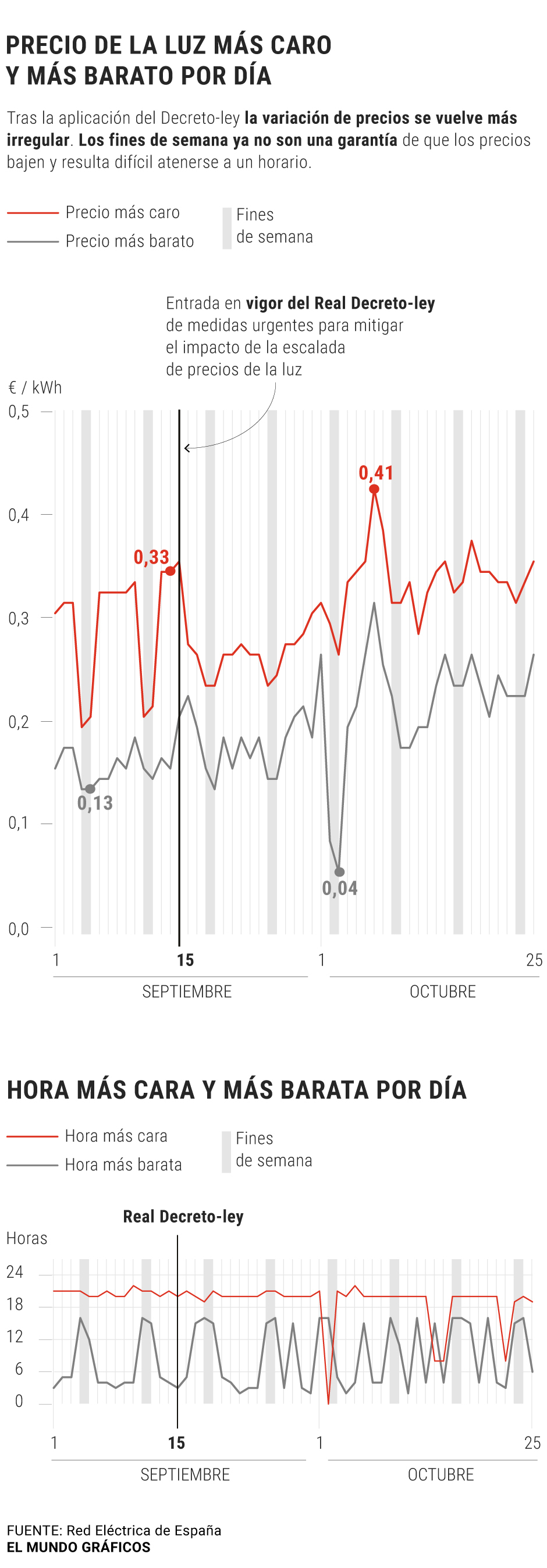The changes introduced by the Government to contain the sharp rise in the price of electricity have turned the bill of millions of homes upside down under the regulated tariff or
Voluntary Price for the Small Consumer (PVPC)
. The controversial time slots introduced last June by the
Ministry of Ecological Transition
and the
National Markets and Competition Commission (CNMC)
to make household consumption more efficient have now been totally blurred by the sharp cut in the regulated part of the invoice approved by Vice President
Teresa Ribera
.
If a few months ago from the Administration it was recommended to put the washing machine during the morning, coinciding with the cheapest hours of the day, reality shows that now the best time to do it is after eating.
Even more confusion for a consumer who does not know in most cases how his electricity supply works.
The reform of the Government and CNMC divided each day into three time sections to increase the cost of tolls and billing charges - what is known as the "regulated part" - at peak times.
In this way, the idea was for families to gradually migrate their demand to the cheapest hours -between 00:00 a.m. and 08:00 a.m.- to avoid overloading the electrical networks and curb unnecessary investments.
The change caused notable price differences between the cheapest hours of the day and the cheapest. In some cases, the price in the expensive section was double that registered in the cheap one. Only in the first half of September, before the
Royal Decree Law
on urgent measures against the rise in the price of electricity
came into force
, the gap reached
13 cents per kilowatt hour.
In addition, it coincided that the cheapest time of day to put the appliances was always during the early morning, with the exception of weekends as they were included in their entirety in the cheap section.
However, Ribera's measures have reduced the gap between expensive and cheap hours since September 15, to
10 cents on average,
and almost half of the times with the cheapest light of the day are already outside this cheap section that runs from midnight to 08:00 hours. In fact, the most repeated 'cheap' hours in the last 40 days have been 4:00 p.m. and 3:00 p.m., according to data published by
Red Eléctrica
and analyzed by this newspaper.
These hours used to be the cheapest on weekends, when the different toll sections disappear and the hourly price is marked only by the cost of energy. This time of day coincides with the greatest contribution of photovoltaic energy due to the abundance of sun, which displaces other more expensive technologies such as gas from the market and contributes to reducing the cost per kilowatt hour. Now, after the sharp reduction in tolls included in the Royal Decree Law, the cost of energy is being imposed and makes the cheapest hours to be found in this time slot regardless of whether it is a weekend or not.
The disorder is such that on
October 2
the most expensive time was 00:00 hours, with a cost of 28 cents, and the cheapest was four in the afternoon, when the electricity cost sank to 7 cents per kilowatt hour and went back to the pre-summer price level for a while.
This situation makes it impossible for any family to establish a pattern in their consumption to try to lower a bill that breaks records month after month. It is no longer enough to automatically program energy consumption during the night hours, since each day is a world and the oscillations depend on much more unstable factors such as the weather itself. The only formula to know the electricity price is to consult it the night before on the Red Eléctrica website or in the different applications that replicate its prices.
In parallel, the Government has initiated a reform of the PVPC with the aim of making it more stable for the 10 million households that have contracted it, among them those considered vulnerable.
Ecological Transition has asked companies and user associations for comments on what to do with the aim of having the new invoice structure approved before the end of this year.
According to the criteria of The Trust Project
Know more
See links of interest
La Palma volcano
Last News
Holidays 2021
2022 business calendar
Home THE WORLD TODAY
Podcast Economia
How to do
Getafe - Celta de Vigo
Girona - Real Zaragoza

